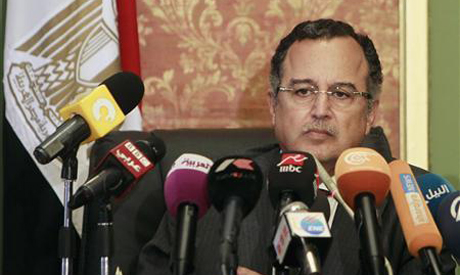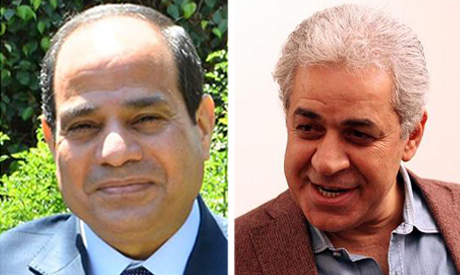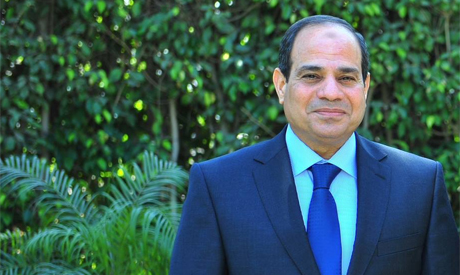Two candidates in the 2012 presidential race -- Islamist Abdel-Moneim Abul-Fotouh and liberal Amr Moussa -- gave Egyptians their first televised election debate.
Despite calls for a repeat performance by Abdel-Fattah El-Sisi and Hamdeen Sabahi -- the only candidates running in next week's presidential elections -- there will be no direct confrontation between the two men.
Sabahi's camp had welcomed the idea of a debate, citing the Nasserist's history of activism going back to his time as a student in the 1970s as proof that he could meet the challenge.
El-Sisi's campaign, however, rejected the idea, approving instead debates between officials from both campaigns, and the former military leader's televised interviews with local and international journalists.
In the absence of a televised debate, Ahram Online has created a virtual debate between the two candidates, summarising the views of both on a number of key issues.
Reconciliation with the Muslim Brotherhood
Both candidates agree that the Muslim Brotherhood will not have a future in Egypt, but El-Sisi has adopted stronger language, vowing to "finish off the Muslim Brotherhood in Egypt” once and for all.
He also announced that he would not allow any Islamist parties or Islamist trends during his presidency, in accordance with the current constitution that prohibits parties based on religion. “The constitution obliges me to disband religion-based parties” he said, despite his being endorsed by the most important Salafist party in Egypt, the Nour Party.
Sabahi has not mentioned the future of Islamist parties in Egypt, but has said that there “will be no security stalking or harassment” of Islamists in Egypt, or of anyone else, if they are committed to “peacefulness.”
The Muslim Brotherhood was designated a terrorist organisation by the cabinet in December.
The military and politics
In his first TV interview after resigning as minister of defence and chief of the armed forces, El-Sisi said “the military institution will not have a role in the management of the country during my term.”
When he was asked about parliamentary supervision of the army budget in the same TV interview, he said “The army is a great institution. All of Egypt should follow the army's example,” avoiding a direct answer to this critical question.
El-Sisi also stated that the army would become involved and provide the government with help in implementing major projects.
Sabahi has been clear about his position regarding the army as well.
“The army’s role is to secure Egypt; it will not get involved in politics and take sides,” he said in an interview, reiterating the point several times.
Sabahi has also stated that during his presidential term there would be parliamentary supervision of the army budget through the national security committee of parliament, in accordance with the 2014 constitution.
Freedoms and human rights
In his first TV interview, which was broadcast by both CBC and ONTV, El-Sisi vowed not to allow security abuses against human rights. “If there are abuses, they will be dealt with in accordance with the law,” he added.
But El-Sisi has also stressed that rights and freedoms must not take precedence over security interests.
“There should be a balance between freedoms and the interests of national security. The media should mobilise public opinion behind a strategic goal and protect the Egyptian state,” he told a group of journalists and chief editors of Egypt’s major newspapers.
In the same meeting, El-Sisi blamed the press for covering protests and publicly criticising officials.
"It is better to whisper in the ears of officials about the problem than to make big noise about it,” he said in the same meeting.
In another recent meeting with a group of intellectuals and writers, El-Sisi vowed to protect freedoms and democracy in accordance with the constitution.
Hamdeen Sabahi, who presents himself as the candidate of the 25 January revolution, has vowed to protect freedom of expression, of the press, of faith and the right to protest.
“Human rights and freedoms in my time as a president will be fully respected," he said in one interview.
Democratic and political reforms
El-Sisi has not revealed much about whether he will adopt political reforms. “Reaching full democracy in Egypt will take no less than 25 years,” he said in a meeting with media figures and journalists.
“I am going to exclude military officials from my administration, except for governors with military backgrounds in the border governorates of Egypt for the sake of national security,” he said in an interview with local privately owned channel ONTV. Some analysts saw this statement as indicating that El-Sisi does not embrace the idea of electing provincial governors, who are appointed by the prime minister at present.
The field marshal has also said that members of his administration will be selected based on their "professionalism and experience."
Sabahi has made more specific comments about possible political reforms.
“I will appoint three vice presidents: one for democracy, one for transitional justice, and one for development,” the presidential candidate said, adding that he will delegate more presidential powers not only to the government but also to governors and local councils.
“We will reduce centralisation, giving the local governors and local councils more powers in the governorates,” he added.
Unlike his rival, Sabahi believes that governors should be elected.
Both candidates have stressed that they would fight corruption.
The right to protest
Protesting has become even more controversial in Egypt in recent months, with a new law passed in November that requires protest organisers to submit plans of their demonstration to the police several days in advance. Those participating in protests that have not been permitted by authorities now face jail sentences.
El-Sisi has said that he would not change the protest law, or pardon those convicted under it.
"This [protest] law came to regulate protests, not to ban them,” El-Sisi said, adding that it is one of the tools of the state in ending the current "chaos” in the country.
“The right to protest is respected but we will not let protests destroy the country,” he has also said.
“The continuing protests are a sign of instability and people are searching for stability,” he said in a recent meeting with editors-in-chief of major newspapers.
As he repeatedly emphasises the importance of work, El-Sisi has also criticised labour strikes. “The protests made the people feel less secure; this is why they have to be regulated,” he said.
Sabahi, however, has vowed to amend the current protest law, describing its current form as “unconstitutional." He also vowed to pardon innocent activists and protesters arrested and imprisoned because of that law while maintaining respect to the judiciary.
Nevertheless, both candidates promised to step down, without the army's interference, if millions of Egyptians protested to demand it, as on 25 January 2011 and 30 June 2013.
The 25 January revolution and Morsi's ouster
The 25 January revolution of 2011, which ousted president Hosni Mubarak, has become an issue of contention in Egyptian public debate, while the date of mass protests against president Mohamed Morsi in 2013, 30 June, has been hailed by the interim authorities and many Egyptians as a second revolution.
“Why can’t we consider 30 June a revolution like the 25 January revolution?" said Abdel-Fattah El-Sisi in an interview on ONTV.
El-Sisi added that the 2011 revolution liberated Egyptians from the "inheritance of power scenario", referring to Hosni Mubarak's son Gamal, and that the "30 June revolution” came to correct the path of 25 January revolution.
Nevertheless, the former head of military intelligence who held direct talks with 25 January revolution activists -- like Wael Ghoneim and the April 6 Youth Movement -- admitted that he has not won the revolution's youth on his side.
Sabahi, an opposition politician under Mubarak, presents himself as the true representative of the 25 January revolution and of 30 June. “If it were not for the 25 January Revolution, there would be no 30 June,” he has said.
He is not shy from drawing comparisons between himself and his rival. “I used to stand against Mubarak and his men and was among the first to be against Morsi when others used to salute him,” he said, an oblique reference to El-Sisi who served in the military under both Morsi and Mubarak.
Police reform
“The Egyptian police need complete support in order to restore security in the country,” El-Sisi has said.
Sabahi, however, has vowed to restructure the Ministry of Interior by improving and developing the police force, making criminal activity its primary focus. According to Sabahi, people will be treated fairly in police stations, without any form of abuse, in accordance to the law.
“The focus of National Security will be counter-terrorism... there will be no state security to stalk politicians,” Sabahi has said.
Reform of the interior ministry has been a major demand of revolutionary groups and human rights organisations since the 25 January revolution.
Modernising religious discourse and ideas
In his first TV interview with CBC and ONTV, El-Sisi said he would work on a mechanism to improve and modernise religious discourse in Egypt.
Yet, in another interview on Sky News Arabia, one week after the first, he said something different: “Modernising religious discourse in Egypt is the responsibility of both Al-Azhar and the church, away from state control."
Sabahi also believes that the state should not exercise control over Al-Azhar and the Coptic Orthodox Church and that religious discourse is the responsibility of both religious institutions.
“Nevertheless, both Al-Azhar and the Church should not replace the state for the citizens, whether that citizen is Muslim or Christian," Sabahi has said.
Economic reforms
The former military chief is in favour of austerity measures in Egypt, advising people to adopt an austere lifestyle. El-Sisi has also suggested that businessmen participate in a fund for development.
In an interview with Reuters, he said that he would try to enact subsidy reform. "We are in a fearful situation now in regard to these subsidies and the way they are distributed. But we won't be able to add more pressure to the poor. Yet we can revise subsidies to allocate more of them to the poor rather than the rich."
Leftist-leaning Sabahi has also said he will reform subsidise so that the rich benefit less, especially energy subsidies given to factories.
On taxation, Abdel-Fattah El-Sisi rejected progressive taxes, but Sabahi has said he would adopt a progressive taxation system.
Sabahi also said he would impose one-time wealth tax.
Both candidates have also spoken of foreign financial aid, especially from the Gulf. "We do not beg from the Gulf states; their aid will be like a Marshall Plan for Egypt," El-Sisi said in his most recent TV interview.
Israel and Palestine
“The peace treaty is stable in the Egyptian conscience,” said El-Sisi when he was asked about the Camp David Accords and its fate during his meetings with public figures.
In his interview with ONTV, El-Sisi stated that he fully respected the treaty and that he may visit Israel on the condition that it recognises Jerusalem as the capital of a Palestinian state.
In his interview with Sky News Arabia, El-Sisi said the Camp David Accords could be amended if there was need for that.
On the other hand, Sabahi, who has been a vocal opponent of the peace with Israel, was clear about his position. Despite expressing his full respect for all of Egypt’s signed treaties and agreements, Sabahi said the Camp David Accords would be amended in accordance with international law, in order to have full control of Sinai.
According to the Camp David Accords, the deployment of Egyptian armed forces is restricted in Zone C, the eastern part of the Sinai peninsula. Egyptian armed forces are deployed through an agreement between Egypt, Israel, the US and the UN.
Relations with Ethiopia
“My first visit as president will be to Ethiopia,” said Sabahi when he was asked about what he would do concerning relations with Ethiopia and the ongoing crisis of the Grand Ethiopian Renaissance Dam.
Sabahi also added that although he would not waste a single drop of water from Egypt’s historical rights to its share of the Nile River water, he will found an organisation for the Nile Basin countries to reach mutual and joint cooperation and development.
El-Sisi, however, has expressed his complete understanding for Ethiopia's need to develop, although he has said that Nile water is a "matter of life and death" for Egypt.
In his latest TV interview, he said he could visit Ethiopia several times in order to solve this urgent matter.
Relations with Ethiopia were negatively impacted by the construction of the dam on the Blue Nile, one of the tributaries of the Nile. Egypt has argued that its historic rights to Nile water are not being respected.












